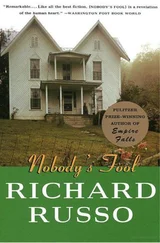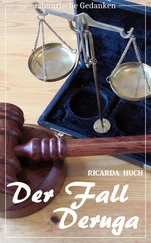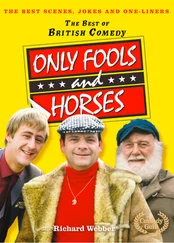“Maybe he’ll change his mind.”
“No, he’s pretty set on leaving.” Then, she gave him a look. “What?”
“How upset would you be if I told you I’ve never really warmed to him?”
“Well, Ruth, he is my son.”
“Maybe I just wish he’d act like it.”
“He probably wishes I’d acted more like a father when he was a kid.”
“And there’s no statute of limitations on that gripe?”
“I don’t know. Should there be?”
“I don’t know either,” she admitted. “We all fuck up, though.” Here she nodded in the direction of her daughter’s apartment.
“That we do,” he agreed. “Actually, I think Peter’s mostly forgiven me. Most of the time we get along pretty well.”
Which was true. Though Peter seemingly remained baffled by how two such different human beings could possibly be related by blood, their relationship had grown easier these last few years. The eighteen months or so they’d worked together before Sully finally retired had helped. Maybe Peter still didn’t understand what made his father tick, but at least he understood the rhythm of Sully’s days, not to mention his nights. And for his part Sully’d been pleasantly surprised to learn that Peter wasn’t nearly as soft as he looked, that he had no quarrel with hard physical labor, even if it didn’t seem to satisfy or speak to him all that deeply.
Certainly he hadn’t been surprised when Peter went back to teaching, and it made sense that he spent most of his free time these days in Schuyler with his academic friends. Every now and then, though, he’d wander into the Horse, where he’d wink conspiratorially at Birdie before sliding onto the stool next to Sully, and there he’d remain, seemingly content, until last call, which pleased Sully. Peter’s relationship with his own adolescent son was fraught at times, and while he never asked for advice about how to handle the boy — and Sully knew better than to offer any — he seemed grateful for his father’s willingness to listen and commiserate. There were even times when Sully thought he might be growing on his son, that Peter was contemplating not just forgiving but forgetting — a possibility that seemed to have occurred to Peter as well, though every time it loomed as their ultimate destination, he pulled back, as if from a hot stove. In turn Sully feared that in some respects his son remained as deep a mystery to him as ever, as mysterious as he himself must have seemed to his own father, as baffling as Will, at times, appeared to Peter. Was this just how this deal worked? How things had to be?
What Sully gradually had come to comprehend was his son’s unhappiness, rooted deeply in his sense of personal failure. That made little sense to Sully, who thought Peter had done all right for himself. After all, he taught at Schuyler’s prestigious liberal arts college, and three years earlier, when the editor of the school’s glossy but failing alumni magazine had retired, Peter had taken it over and breathed new life into the publication. Also his movie, book and music reviews were regular features in Albany’s alternative newspaper. Though now middle aged, he was still good looking, and his easy charm a steady magnet for mostly younger women. And he’d raised a son who’d graduated in January, six months ahead of his high school classmates, and spent the spring semester taking college courses in Schuyler. In the fall he would enroll as a second-semester freshman at Penn on a full scholarship. Much to be proud of here, Sully figured.
Peter, of course, saw all this through a different lens. His once-promising career had never recovered from being denied tenure at the state university that had originally hired him. Now, as an adjunct instructor, he was a distinctly second-class academic, and thanks to the unforgiving nature of that world he would forever remain one. His salary was a fraction of what his full-time, tenured colleagues were making, and he had no job security. He was writing reviews, not books or scripts. His marriage had failed, and thanks to Charlotte, his vindictive ex-wife, he seldom saw his troubled middle son. Nor did it take long for the new women in his life to realize that, beneath his easy charm, he was bitter and discontented.
What Sully had the hardest time doping out was how Peter expected leaving Bath would improve any of this. He understood that with Will heading off to college, things were changing, and it made sense that he’d want to live close to his son. And, sure, there were more teaching opportunities in an urban setting, but if he moved to New York City, which seemed to be the plan, there’d also be more competition, wouldn’t there? And his cost of living would easily triple, probably even worse. But when Sully’d raised these issues, Peter — no surprise — took it poorly. “Dad,” he said, “once Will’s gone, why would I stay here? To take care of you in your old age?” Which hadn’t been what Sully was suggesting at all. He’d wanted Peter to understand that there was no need to rush off if he didn’t want to, that Sully himself was content to remain in the trailer if Peter wanted to stay on in Miss Beryl’s large downstairs flat. That way Will could come home on vacations. In fact, he was willing to sign the house over to Peter then and there. It’d be his one day anyway, maybe sooner than he imagined. “What would I do with this house, Dad?” Sell it when the time seems right, Sully had suggested, but Peter had just smiled that knowing smile of his that always annoyed Sully to the nth degree, the one that implied Sully was trying to put one over on him.
On the other hand, could he really blame Peter for being suspicious of his motives? If Carl Roebuck ever moved out of the upstairs flat, which Sully himself had occupied while his landlady was alive, it would make sense for him to move back in, and he could see how that might make Peter nervous. Maybe he had no intention of letting Peter or anybody else take care of him, but his son couldn’t know that. He was probably thinking ahead to the day when he’d fall and break a hip or have a stroke and end up in a wheelchair. He couldn’t blame Peter for wanting to be far away when any of that shit happened.
Still, if Peter moved to New York, Sully would miss hearing his footfalls on Miss Beryl’s porch and the ticking of his car engine as it cooled in the drive, miss having him show up unexpectedly and slide onto that stool at the Horse. And of course he’d miss his grandson, too. He actually had more in common with Will, which his father no doubt sensed. The boy may have inherited Peter’s intelligence, good looks and charm, but he was also tough, a talented three-sport athlete. In his junior year, he was the starting middle linebacker on the varsity football team, and Sully had secretly smiled when it became clear that Will enjoyed hitting people as much as he had himself. The boy’s tackles were always clean, never intended to injure, but they loosened molars just the same. What pleased him most about the boy’s physicality was that when he’d arrived in Bath a decade earlier he’d been afraid of his own shadow.
Peter seemed proud of his son’s toughness, too, but not, unless Sully was mistaken, unambiguously so. And while he was happy that Will loved Sully, he seemed less anxious for his son to admire or emulate him. Any youthful enthusiasm he expressed for how his grandfather navigated the world Peter considered his duty to temper, lest the romance of the tool belt and barstool take root. Indeed, by leaving Bath before Will reached legal drinking age, Peter might be trying to ensure that the stool next to Sully’s at the Horse would not be part of Will’s inheritance.
All of this, Sully supposed, was what Ruth objected to, the reason she couldn’t quite, as she put it, warm to his son.
Читать дальше












